February 25th, 2014
A roundtable titled “Entrepreneurship In Serbia – A Necessity Or An Opportunity?” that took place on February, 25th 2014 at the Aeroklub in Belgrade attempted to respond to the question of whether the small and medium enterprises (SME) sector contains hidden potentials that could significantly help Serbia get out of its current difficult economic situation by changing attitudes towards entrepreneurship and creating a more favorable economic environment. The brochure produced by the Center for Advanced Economic Studies (CEVES) presents the initial research findings of its fact-based program devoted to developing Serbian entrepreneurship.
We wish to draw the attention of the general public, decision-makers and entrepreneurs to the fact that small businesses contain an enormous amount of potential that has been held back for years. Expert opinions, as well as broader public opinions, are currently divided about how Serbia should pursue and achieve economic progress. One view is that progress comes solely through foreign direct investments (FDIs) and all reforms within the country should be directed towards creating a favorable economic environment that would attract such investments. A different view is that the position of the State should be strengthened, with it taking a more active role in the creation and revival of national industrial systems. Both models view entrepreneurship, as the “second-rate” economy, i.e. an additional category created out of necessity or by relying on conditions resulting from the “first-rate” economy, i.e. large enterprises, either foreign or local. Some of the findings of the study conducted by CEVES in the fall of 2013 are extremely discouraging for current entrepreneurs, but even more so for future entrepreneurs:
- the interest of Serbian citizens in making entrepreneurship their first choice for finding employment is far bellow the European average,
- an overwhelming two thirds of citizens wish to be employed in the public sector,
- necessity and “survival” were given as motivators for starting one’s own business, as opposed to material gain and well-being, both personal and in one’s community (the only encouraging answer was creativity, which was highly ranked),
- risk and uncertainty of the business environment, and continuous changes in legislation – reinforced by a lack of belief in a just state – seriously discourage entrepreneurship.
“We wish to confront the above-mentioned negative attitudes with the facts CEVES discovered through its research. Namely, small and medium enterprises and entrepreneurs have been the job-creators for the past several years in Serbia, while large companies have lost jobs due to restructuring. In addition, almost half of the large companies today grew out of small and medium ones, and they comprise the healthier half.” – stated Ms. Kori Udovicki, director of the Center for Advanced Economic Studies. Some important findings revealed that:
- the contribution of SMEs to total employment in 2012 was three quarters (72%),
- the contribution of SMEs to overall corporate income growth from 2002 to 2012 (not including smaller entrepreneurs who do not pay VAT and we don’t have any data on) was more than half (53%),
- small businesses contribute almost half of the total exports from Serbia, and out of the 1000 largest exporters as much as 60% are from the SME sector. In addition, SME’s have shown to have had a “hardier” response to the global economic crisis; their exports grew faster between 2008 and 2012 than did the exports of larger companies.
The CEVES study has revealed that the majority of small businesses in Serbia developed by relying on local demand, as mediators/suppliers of citizens, larger systems and the state. Other SME champions are those that based their growth and development of domestic demand and then discovered opportunities on the international market, once they had built up enough economic strength. Finally, there are those SMEs that found opportunities on the international market by being innovative or having a competitive advantage in highly specialized fields. We appeal on the future government to turn towards entrepreneurship and make this one of its key tasks, such as by adopting an official document at the highest level of power that would introduce entrepreneurship into the “DNA” of the education system and training of public officials in all parts of the government, that they may learn about the potential of entrepreneurs to contribute to the country’s economic development. This means turning towards all the things the citizens of Serbia can do “with their own hands” if they are able to conduct their business in an environment that is favorable for entrepreneurship, that values creative spirit and efforts. An important message would be delivered by changing the Serbian usage of “entrepreneur” (preduzetnik) as a legal term for sole proprietorships, and would prevent entrepreneurs from being excluded from databases and analyses regarding the SME sector. Support to entrepreneurship and SMEs doesn’t come from subsidies and donations, it comes from a supportive environment, from providing concrete conditions for developing and realizing long-term ideas. The concrete needs and measures of support for small businesses can be envisioned and developed only by learning more about entrepreneurship, and a close dialogue between the State and entrepreneurs. We believe that Serbia will have a hard time getting out of the rut it is currently in unless it relies more on energy, creativity, and the hundreds of thousands of people who are entrepreneurs right now, or would gladly become entrepreneurs if they had more support from their environment. This would make prospective entrepreneurs feel more valued and more supported, and would encourage broader society to dedicate more attention and care to creating conditions that would promote and increase the likelihood of entrepreneurial successes.

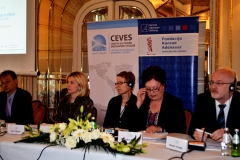
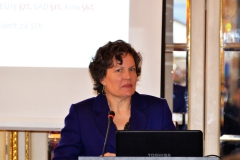
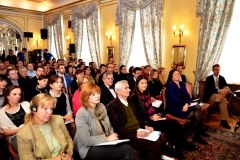
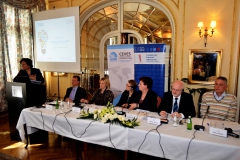
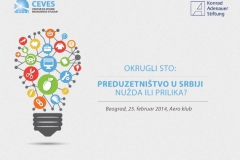
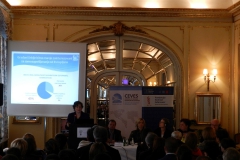
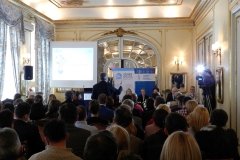

 SR
SR